Earth Watch Report - Extreme Temperatures
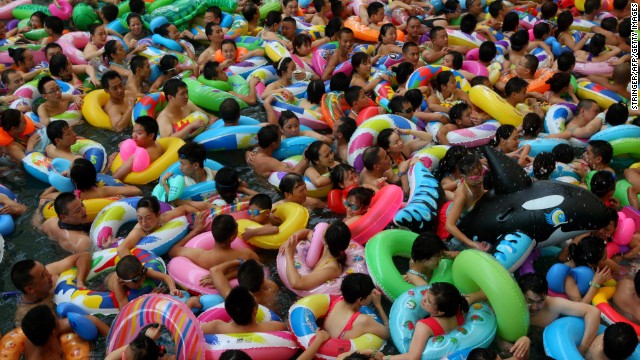 People
are packing into swimming pools or taking refuge in caves to escape the
fierce temperatures. Local governments are resorting to cloud-seeding
technology to try to bring rain to millions of acres of parched
farmland.
People
are packing into swimming pools or taking refuge in caves to escape the
fierce temperatures. Local governments are resorting to cloud-seeding
technology to try to bring rain to millions of acres of parched
farmland....
| 02.08.2013 | Heat Wave | China | [Statewide] |
...
Heat Wave in China on Tuesday, 30 July, 2013 at 17:08 (05:08 PM) UTC.
| Description | |
| The heatwave that settled over China for more than a month now is proving unrelenting, breaking 104 degrees F (40 degrees C) in more than 40 cities this month. Temperatures are projected to climb to almost 106 degrees F along the eastern seaboard and in Xinjiang over the next few days. Here’s how things currently look across the country. Several have died of heat strokes already, including construction workers, many of whom are migrants with weak worker protections and limited health care benefits. Xinhua reported that the mortality rate for heat strokes could be as high as 50%-70% due to lack of timely treatment. Meanwhile, a drought in Guizhou has left 1 million without a steady supply of water, with electricity and water usage off the charts in many other cities as well. As temperatures soared, people all over China devised ways of beating the heat, driving what some call "the heatwave economy". On Taobao, China’s eBay-cum-Amazon, searches for heat deterrents are up, with a PR rep reporting 2.5 times as many fan sales as last year. Meanwhile, restaurants and groceries are doing brisk business in deliveries. Some have sought more active ways of cooling off. Around 15,000 people in Sichuan province, where the high was 100 degrees F, thronged a wave pool in a resort near "China’s Dead Sea." Online commenters quickly arrived at a name for them: "boiling dumplings". Along with "heatwave" and "heatstroke," "China’s Dead Sea" was among the top most discussed items on social network Sina Weibo today. In Shanghai, today was the hottest day in recorded history, with temperatures hitting 105 degrees F. Those without air conditioning found refuge from the heat in this supermarket. In Wuhan, students at Central China Normal University began finding refuge in the air conditioned gym back in late June, when the heat wave began (most college dorms in China lack air-conditioning). Temperatures hit 104 degrees F there today. More than 100,000 people squeezed onto this Dalian beach in northern China. The brutal heat is proving a boon to China’s beach resorts. |
Heat Wave in China on Tuesday, 30 July, 2013 at 17:08 (05:08 PM) UTC.
Back| Updated: | Friday, 02 August, 2013 at 03:31 UTC |
| Description | |
| Just how hot is it in China? So hot that people are frying shrimp on manhole covers and cooking pork on sidewalks. College students have escaped the sweltering, stuffy heat of their dorm rooms for gym floors and rooftops. The tech-obsessed country even has people afraid of their cell phones. "I'm so worried that the phone will explode while I'm using it," one teenager said. Millions of people in China are experiencing record-breaking temperatures in the south and eastern parts of the country, a multi-week heat wave that has let to dozens of deaths and crop failure. Since early July, most parts of the south have experienced temperatures over 95 degrees and even up to 104. "About 19 provinces and regions are experiencing scorching heat, covering more than 3 million square kilometers, almost a third of the country," He Lifu, chief weather forecaster at the National Meteorological Center, told the China Daily. This week, China's Meteorological Administration issued its second-highest heat alert for the first time ever, with the warning that temperatures could stay up until August 8. At least there's opportunities to cool off -- sort of. Nearly 15,000 people visited the same pool in China's Sichuan Province on Saturday, triple the expected amount. One swimmer made an analogy that's taken off on social media: "There's so many people here, it's like a cauldron of boiling dumplings." | |
| 02.08.2013 | Heat Wave | China | Municipality of Shanghai, Shanghai |
Heat Wave in China on Tuesday, 30 July, 2013 at 16:58 (04:58 PM) UTC.
| Description | |
| Shanghai's extreme heat has claimed three lives in the past few days as the city shows no sign of relief from the heat wave. By 5pm today, three people had died from heat stroke at Minhang District Central Hospital, doctors said. Two other heat stroke patients were in critical condition, the hospital said. The city has recorded 24 days with the mercury hitting 35 degrees Celsius and above in July. The last time Shanghai had 23 days of high temperatures in July was in 1934. |
Heat Wave in China on Tuesday, 30 July, 2013 at 16:58 (04:58 PM) UTC.
Back| Updated: | Tuesday, 30 July, 2013 at 18:52 UTC |
| Description | |
| The death toll from the persistent hot weather in Shanghai has crossed 10, officials confirmed yesterday. More than 10 people have died of heat stroke this summer in Shanghai, including three in Minhang, the Shanghai Center for Disease Control and Prevention said late yesterday. About one-third of them fell sick even though they spent time indoors, the center said, without giving more details. The latest victim succumbed to heat stroke at the Minhang District Central Hospital yesterday, in addition to two patients who died there on Saturday. The hospital said another two patients were in life-threatening condition. A doctor at the hospital advised senior citizens not to avoid air conditioning, dismissing a widely held belief among the elderly Chinese that air conditioning was unhealthy or a waste of money, according to a Xinhua news agency report. The high temperature yesterday stood at 39.4 degrees Celsius - the 24th straight day of high temperatures in the city - and making July the hottest summer in decades, according to the Xujiahui observatory. The previous record was in July 1934 which had a total of 23 high temperature days when it hovered at or above 35 degrees.The mercury is likely to stay around 39 degrees today and in the coming days. Showers and thunderstorms are likely in parts of the city in the afternoon but any thought of relief from the heat is likely to be short-lived. "It's less likely that we will see a typhoon that can bring relief to the high temperatures in Shanghai by August," Wu Rui, a chief service officer at the Shanghai Meteorological Bureau, said. "Typhoons usually come when the subtropical high turns weak. This year that is likely to be in the middle or end of August." The bureau has warned the elderly, pregnant women and those suffering chronic diseases, especially cardiovascular ailments, to refrain from going outside between 10am to 4pm, the hottest time of the day. A 63-year-old retired worker who suffered severe heat stroke was also in critical condition in Renji Hospital yesterday. The man fainted on the road when he was collecting waste in the scorching sun. "But it wouldn't be right to say that he fainted because of heat as he also suffered from cardiovascular and cerebrovascular disease for years," a doctor at Renji Hospital said. Renji Hospital said it was dealing with 13,000 patients every day, a 10 percent jump than usual. Most of them suffer acute gastroenteritis, air-conditioner related diseases and respiratory tract infection. People in the suburbs are most likely to suffer from heat stroke because of lack of air-conditioners and other measures to protect them from the heat wave, said Song Guofan, a city health bureau official. | |
Heat Wave in China on Tuesday, 30 July, 2013 at 16:58 (04:58 PM) UTC.
Back| Updated: | Friday, 02 August, 2013 at 03:40 UTC |
| Description | |
| Medical
experts in Shanghai have warned people, especially the elderly, to stay
out of the sun and remain cool, as high temperatures continue to claim
lives. At least 11 people have died of heat stroke in Shanghai so far
this summer. The city's temperatures have been 39 C or above in recent
days and the local meteorological department said this July is the
hottest in decades. Leng Guangming, an official from the Shanghai Center
for Disease Control and Prevention told China Daily on Wednesday: "In
addition to those exposed to the sun, many people, especially the
elderly, have gotten sick indoors because they don't have
air-conditioning. It's important for people to pay more attention to
heat stroke prevention." Statistics from the center show that more than
10 people aged 20 to 60 have died of heat stroke in Shanghai this
summer, more than 60 percent of them spending long periods outside in
physically demanding activities. Unlike other heat-related conditions,
heat stroke is a medical emergency that is often fatal if not promptly
and properly treated. It is a form of severe hyperthermia, an abnormally
elevated body temperature, usually 40 C or higher, with accompanying
physical symptoms, including changes in the functioning of the nervous
system. "In extremely hot and very humid weather, the body may not be
able to dissipate the heat and evaporate sweat. Consequently, the body
temperature rises," Leng said.The latest victim was a 64-year-old
merchant seaman from Taiwan who died on Wednesday morning, having
arrived in Shanghai on July 13. He began to show symptoms of severe heat
stroke on July 23 and fainted. He was taken to Shanghai Longhua
Hospital, where he received emergency treatment, but died of organ
failure several days later. According to Minhang District Center
Hospital, two out of the eight patients who suffered serious heat stroke
since July 26 have died, despite a series of emergency treatment
measures. Treatments include both physical and drug-induced methods of
reducing body temperature, correcting dehydration and prevention of
multiple organ failure. "Most of these patients are aged 50 or above and
face a higher risk of heat-related medical problems," said Deng Xingqi,
a doctor from the Minhang District Center Hospital. Deng said that
among the eight patients, only one became sick outdoors, while the rest
suffered heat stroke indoors. Songjiang District Center Hospital says it
has received five serious heat stroke cases, three of them with
patients aged over 60. A 70-year-old patient used an electric fan to
cool himself down but fainted at home when the outside temperature
reached 40 C. Many older patients have suffered from cardiovascular and
cerebrovascular disease for years. The high summer temperatures and high
humidity have increased health risks, the doctor said. In addition to Shanghai, some neighboring provinces have also reported a number of heat-related fatalities. At least seven fatal cases caused by heat stroke were reported in Jiangsu province. And Zhejiang province has reported at least eight deaths from heat stroke, most of them people who spent a long time in the sun. Doctors advise that those who faint due to heat should be quickly removed to a cool place with plenty of air, and measures should be taken to lower their body temperature, such as pouring cold water on the body or wiping the body with a wet towel. Meanwhile, it's important to give patients lots of water to replace lost fluids, and if possible, salt to replace salts lost through sweating. Rehydration powders mixed with water can be useful for this purpose. On Wednesday, Shanghai saw the 25th straight day of temperatures above 35 C in July, with its maximum temperature reaching 39.8 C. The city's meteorological department said the mercury is likely to stay around 39 C in the coming days despite thunderstorms in some parts of the city. | |
Authorities warn of heat stroke risk in Shanghai
Updated: 2013-08-02 10:47
By Wang Hongyi in Shanghai (China Daily)
Medical experts in Shanghai have warned people, especially the elderly, to stay out of the sun and remain cool, as high temperatures continue to claim lives.At least 11 people have died of heat stroke in Shanghai so far this summer. The city's temperatures have been 39 C or above in recent days and the local meteorological department said this July is the hottest in decades.
Statistics from the center show that more than 10 people aged 20 to 60 have died of heat stroke in Shanghai this summer, more than 60 percent of them spending long periods outside in physically demanding activities.
Unlike other heat-related conditions, heat stroke is a medical emergency that is often fatal if not promptly and properly treated. It is a form of severe hyperthermia, an abnormally elevated body temperature, usually 40 C or higher, with accompanying physical symptoms, including changes in the functioning of the nervous system.
"In extremely hot and very humid weather, the body may not be able to dissipate the heat and evaporate sweat. Consequently, the body temperature rises," Leng said.
The latest victim was a 64-year-old merchant seaman from Taiwan who died on Wednesday morning, having arrived in Shanghai on July 13. He began to show symptoms of severe heat stroke on July 23 and fainted. He was taken to Shanghai Longhua Hospital, where he received emergency treatment, but died of organ failure several days later.
Read More Here
...
People, crops and fish suffer in China heat wave
updated 4:17 AM EDT, Thu August 1, 2013
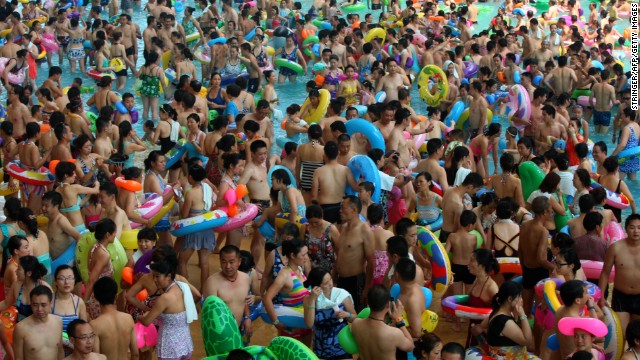 Mass
crowds of people attempt to cool off at a water park in Suining,
Sichuan province on Saturday, July 27, amid a record heat wave hitting
19 provinces and regions in China.
Mass
crowds of people attempt to cool off at a water park in Suining,
Sichuan province on Saturday, July 27, amid a record heat wave hitting
19 provinces and regions in China. Hong Kong (CNN) -- Record-breaking temperatures have been searing large swaths of China, resulting in dozens of heat-related deaths and prompting authorities to issue a national alert.
People
are packing into swimming pools or taking refuge in caves in their
attempts to escape the fierce temperatures. Local governments are
resorting to cloud-seeding technology to try to bring rain to millions
of acres of parched farmland.
The
worst of the smoldering heat wave has been concentrated in the south
and east of the country, with the commercial metropolis of Shanghai
experiencing its hottest July in at least 140 years, according to state
media.
Thu August 1, 2013
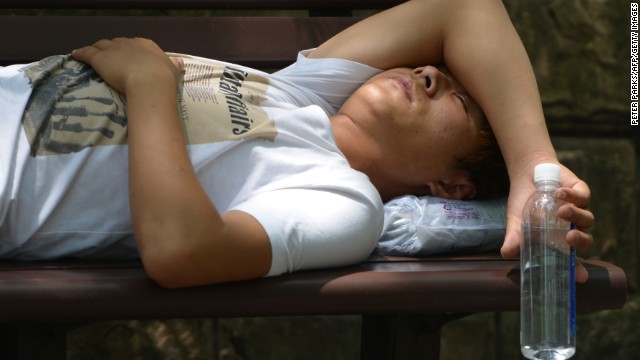 A man takes a break from the heat in a Shanghai park on July 2.
A man takes a break from the heat in a Shanghai park on July 2.
Temperatures
in the sprawling city of 23 million inhabitants reached 35 degrees
Celsius (95 degrees Fahrenheit) or higher on 25 days in July, the
state-run news agency Xinhua reported Wednesday. More than 10 people
died from heatstroke in Shanghai during the month, it said.
But the brutal temperatures aren't confined to the Shanghai region.
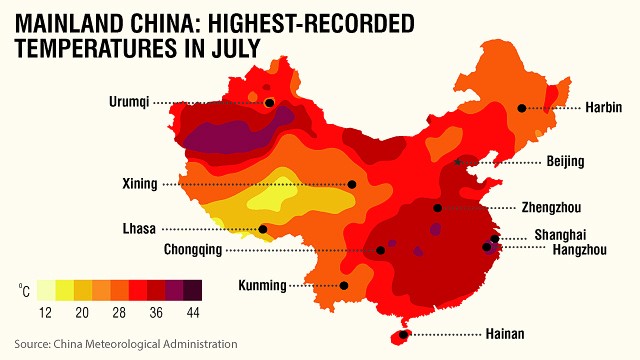 Heat wave - how hot is it?
Heat wave - how hot is it?
"About
19 provinces and regions are experiencing scorching heat, covering more
than 3 million square kilometers, almost a third of the country," He
Lifu, chief weather forecaster at the National Meteorological Center,
told the English-language newspaper China Daily.
Related articles


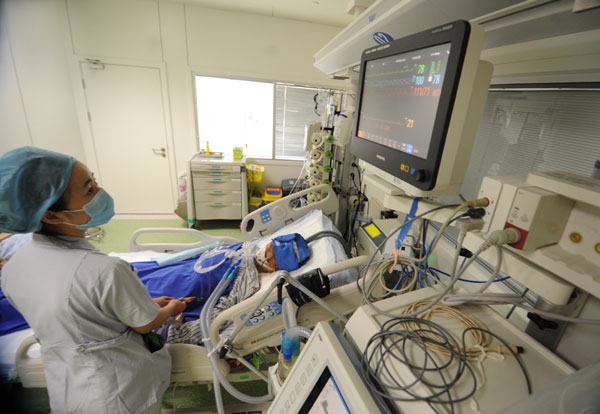










No comments:
Post a Comment
Hello and thank you for visiting my blog. Please share your thoughts and leave a comment :)